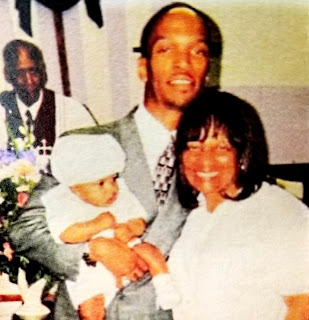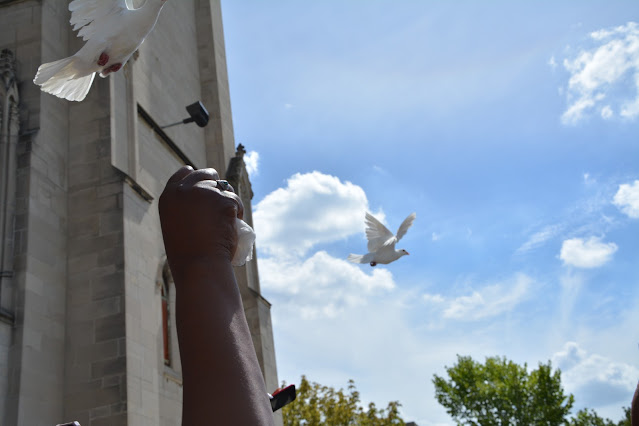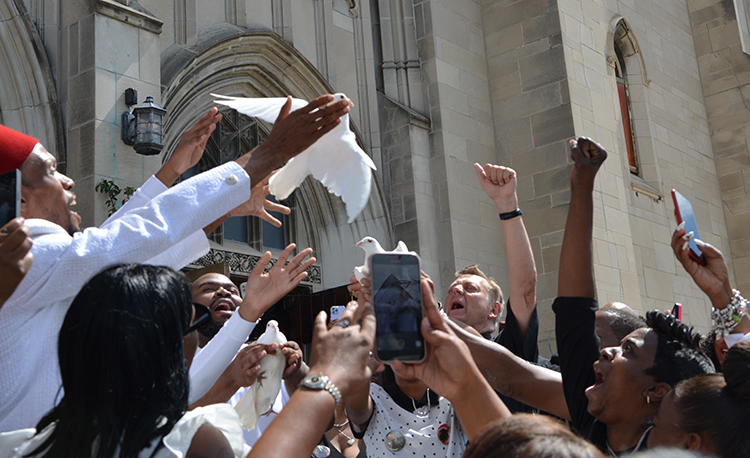 |
| Rodney White-El with son Khalil and the child's grandmother. (Photo: Provided) |
But a good father can be a son’s compass. Even if fatherhood arrives devoid of a handbook. Even if the elements that can steal a son’s life hover sometimes like storm clouds even on some sunny days.
And a son can be the light that inspires a father to be a better man. That compels a man to be a better father than his father. To provide for, produce and protect a son with endless selfless devotion. To carry him in life, and also in death. And perhaps beyond.
"I looked at him as my angel..."
 |
| Rodney White-EL and son Khalil during happier times. (Photo Provided) |
Rodney White-EL wanted to give his son a strong name, one with purpose and power. He chose to name him after one of the elders who was “like a father” to him at the Nation of Islam, where he was a member at the time.
He chose “Khalil”—meaning friend of Allah. He chose “Tariq” as his middle name—meaning “night star.” The “EL” signifies their Moorish American heritage and, for the father, his own transformation, both naturally and spiritually, through his Islamic faith.
White-EL spoke his son’s name to him while he was yet in his mother Regina Howard’s womb. Sometimes he moved his lips close to her belly while rubbing cocoa butter so that their unborn son might feel his voice’s vibrations.
“Khalil!” he called to him as his son responded with a kick the father could feel while placing his hand on her stomach.
“I can’t wait to meet you, you a little feisty dude.”
On Nov. 9, 2003, Khalil entered their world. He didn’t scream, didn’t really cry, only squinted his eyes--when his father finally held him--smiled.
 |
| A banner in memory of Khalil stands inside St. Sabina during services (Photo: John W. Fountain |
By White-EL’s account, his own father was a gangster. A man who moved from New Orleans to Chicago and settled on the West Side. He ran policy and owned a liquor store.
White-EL’s mother was a devout Christian who kept her children in church on Sundays. It was kind of like a heaven and hell situation. As a youngster, White-EL drank his first “forty” (ounce bottle of malt liquor) with his father. White-El says he ended up battling alcoholism, being ensnared by the streets. He didn’t want that for his son.
He changed his life, motivated by his faith in Allah. By the example of good men like Supreme Grand Sheik E. Braswell Bey of the Moorish Science Temple of America. And by his love for Khalil.
He quit the streets. Quit drinking and smoking. Devoted himself to work and fatherhood. He doted on Khalil, who was always full of life and energy, always running, jumping, playful and smart beyond his years. He took his son everywhere he went. Gave him his first haircut and every other haircut over 18 years.
%20stands%20at%20the%20podium%20speaking%20durinf%20services%20for%20his%20son.jpg) |
| Rodney White-EL (on left) stands at the podium speaking during services for his son (Photo: John W. Fountain) |
Khalil was fatally gunned down on Aug. 23, in a South Side alley, after starting a new job. No one has been charged.
On Friday morning, hundreds of mourners at the Faith Community of St. Sabina filed past a black open casket adorned with red and white carnations, roses and peace lilies and anchored by a banner with Khalil smiling in life amid a somber song with piano and flute.
“Of course it hurts, of course we are angry, and of course we are determined to get justice for Khalil,” White-EL told mourners. “If I didn’t have my faith, I would literally lose my mind.”
Standing on the church’s stone steps, the crowd of mourners shouted, “Khalil!” over and over and over again. The father, brokenhearted but smiling widely, released a dove into the cloud-filled blue sky. A symbol that his son and their love still lives.
#JusticeForJelaniDay
 |
| Mourners gathered at the Faith Community of St. Sabina for services for Khalil White-EL (Photos: John W. Fountain) |
 |
| Moments after being released by the family in Khalil's honor, doves take to the sky |

